
By Jessica Holmes
Welcome to another serial of Doctor Who. This month, we’ll be taking a trip through history, to the height of the Third Crusade, when Richard I ‘the Lionheart’ of England marched on Jerusalem, bringing him toe-to-toe with An-Nasir Salah ad-Din Yusuf ibn Ayyub (better known as simply ‘Saladin’). It’s the height of the Middle Ages, where the knights are holy, the princesses are beautiful, and the kings are noble and just. But are they really? Come along with me as I trail after the Doctor and his companions, and we’ll sort the fact from the fiction, and perhaps squeeze an adventure in along the way.
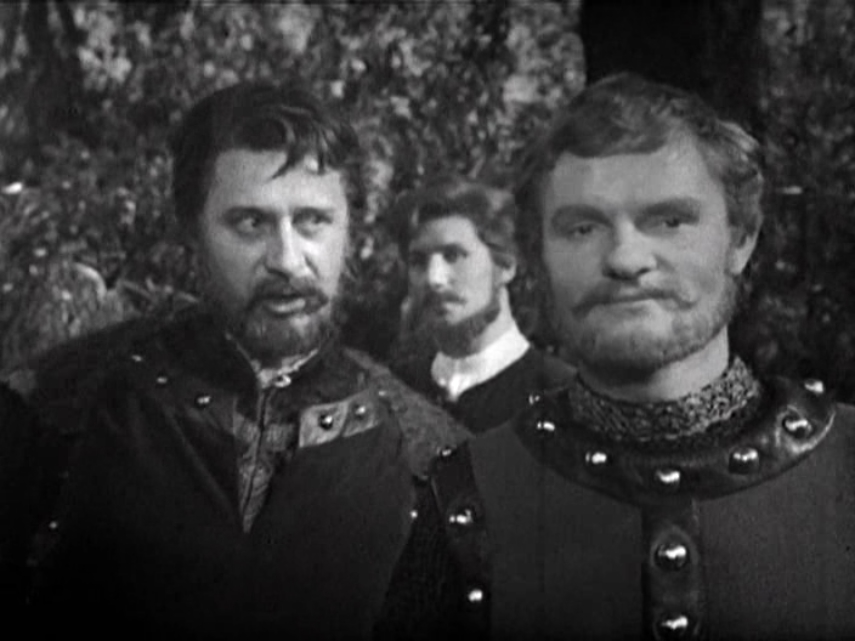
THE LION
The TARDIS arrives in the forest, a peaceful place one might think. However, some knights come walking by, and they’re being watched by a pair of fellows who would appear to be Saracens.
Well, they would if they weren’t being portrayed by White actors in makeup. Not even thirty seconds into the serial, and I have to put the brakes on to call attention to a serious issue. I have touched upon this issue before, when covering Marco Polo with its extensive use of yellowface makeup. It would seem that Doctor Who has not learned from its past error. I am disappointed, but I am not surprised. After all, it’s not as if the BBC is stranger to deeply racially insensitive programming. Just look at The Black And White Minstrel Show. Or, better yet, don’t.
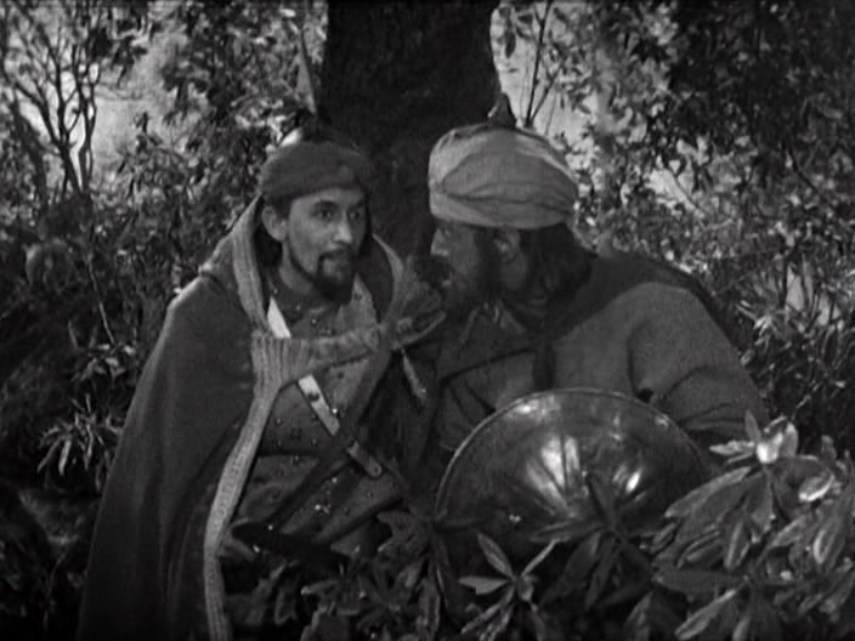
How am I to have any faith that the story will do justice to this complex and layered period of history, and the people involved, if it is not built on an authentic foundation?
With a sour taste in my mouth, I’ll press on.
The knights are in the party of King Richard I (played by Julian Glover), who is encamped in the forests outside the city of Jaffa, much to the consternation of his men. After all, it’s the perfect spot for an ambush.
Enter the Doctor and crew, who barely take two steps outside the TARDIS before getting into a fight with a Saracen. Working together, the Doctor and Ian manage to subdue their attacker, but realise too late that Barbara has been abducted.
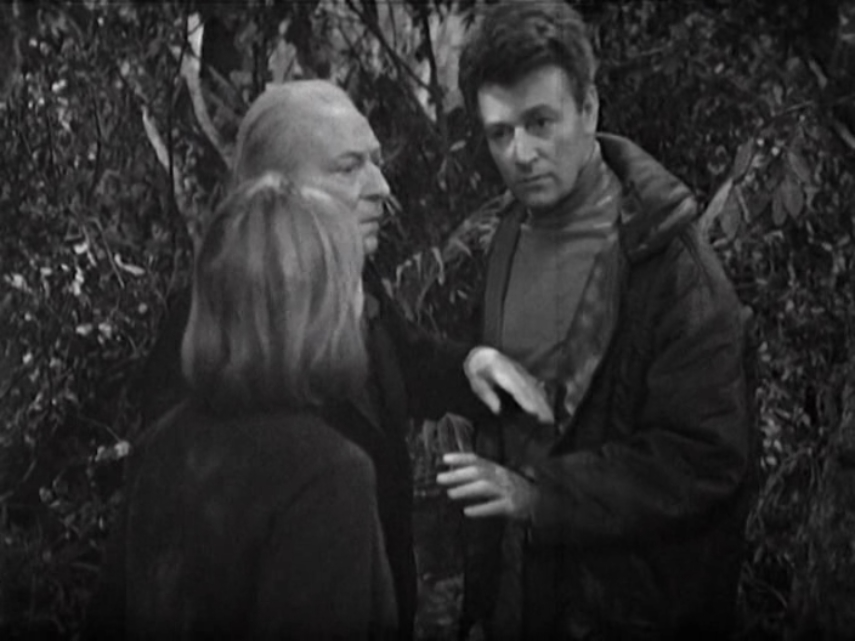
Things are even worse for Richard and his knights. This is indeed the perfect spot for an ambush. As the Crusaders drop like flies, King Richard takes a wound, and one of his knights bravely steps up and declares himself to be the king, allowing himself to be captured in Richard’s stead.
Having survived the battle, the companions gather together, and piece together approximately when and where they are. Upon realising King Richard is close by, the Doctor is eager to get into his favour. Fortunately, one of his knights survived the battle, albeit wounded. Surely Richard will be pleased to see him.
Barbara arrives at the Saracen camp in Ramla, where she meets the knight we saw pretend to be the King, name of Sir William des Preaux, who confides in her the ruse he’s pulling on the Saracens, and they decide to pass her off as his sister, Joanna.
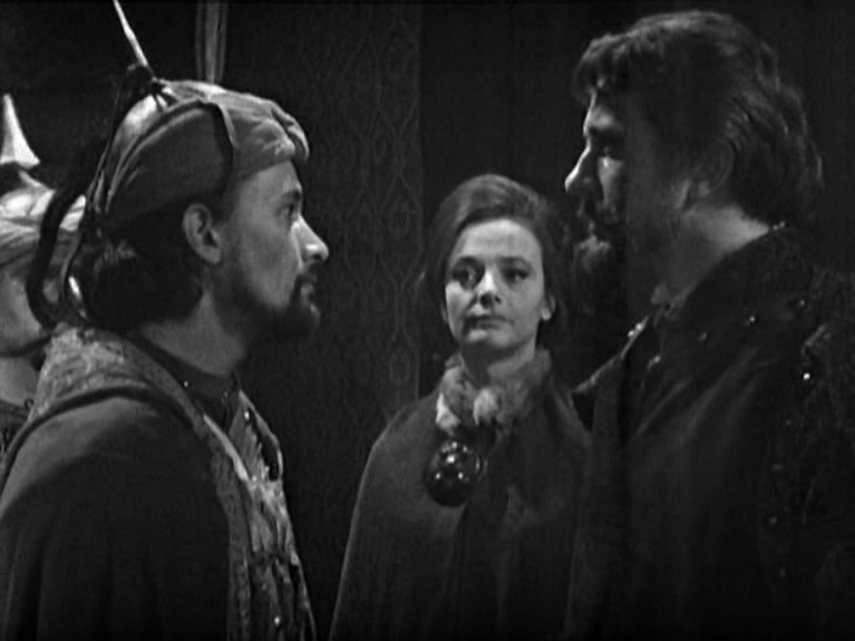
The man who captured her, the scarred El-Akir (portrayed by Walter Randall, who you may recognise as Tonila in The Aztecs) comes and asks if they’re satisfied with their treatment, as Saladin has ordered that captives be treated well. That’s nice of him. It’s also true, as he was known for his mercy to enemy soldiers and civilians.
However, William attempts to tell El-Akir that Babara has not been treated well enough, but El-Akir cruelly rebuts him, reminding the pair that Barbara has no rights but those which Saladin grants. Well, why did you bother asking if you’re going to reject anything other than a glowing review?
I can’t help but notice that all the speaking Saracen roles so far are filled by White actors in makeup, but the background extras are not.
There’s a subplot about the Doctor doing a bit of shoplifting to get clothes so they can blend in, but it’s not essential to the story, so I will leave it at this: he shoplifts, later gets caught out, and manages to talk his way out of the consequences because the goods were stolen anyway.
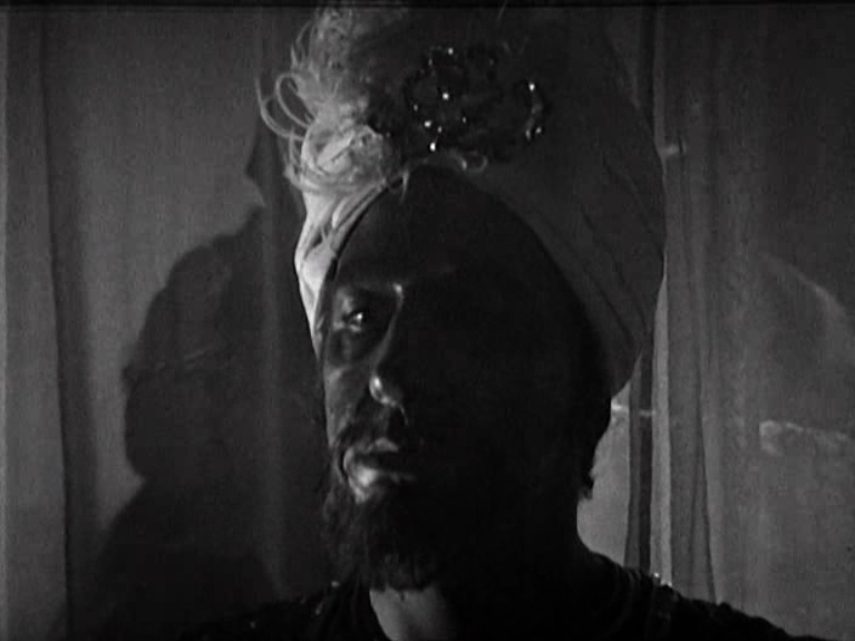
El-Akir tells Saladin (portrayed by Bernard Kay, who also played Tyler in The Dalek Invasion Of Earth) that he’s successfully captured King Richard himself, along with his beautiful sister. However, Saladin's brother, Saphadin, instantly spots the deceit, realising that Barbara, lovely as she is, is not the Lionheart’s sister.
As things begin to kick off, Saladin pipes up that Sir William isn’t King Richard, either. I suppose Sir William didn’t consider that perhaps a clever man like Saladin might take the time to find out what his enemy looks like.
He orders that Sir William still be treated well, and the others leave, leaving Barbara alone with Saladin and his brother while they decide what to do with her. He asks how she came to be here, and Barbara explains as best as she can, being remarkably frank about her travels through time and space.
Saladin assumes that she means she’s with a group of players, entertainers– in other words, not useful. However, he’s not one to casually kill someone if there’s a chance he could make use of them. He invites her to dinner, where she’ll step into the shoes of Scheherazade. If she can entertain him, she gets to live.
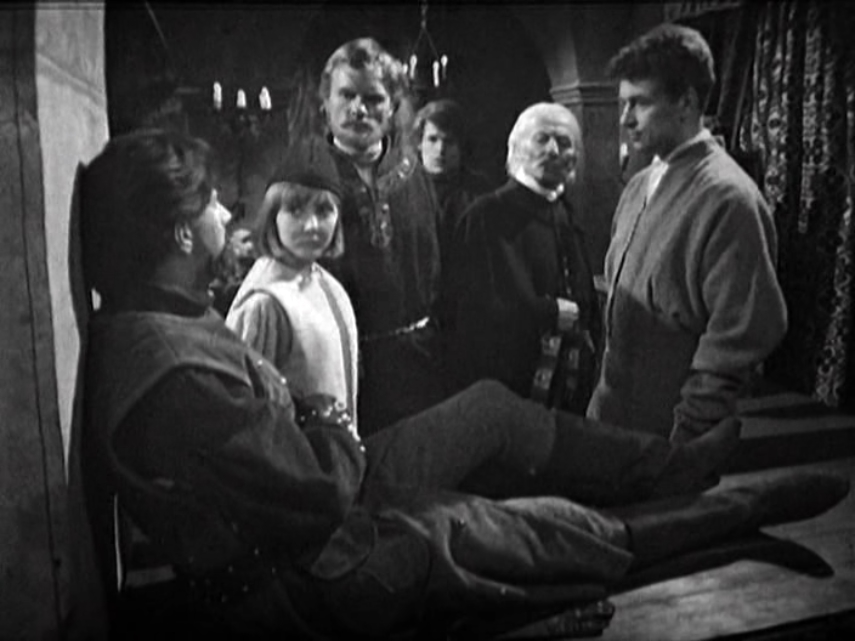
Back in Jaffa, the rest of the gang bring the wounded knight to King Richard and report their doings.
Richard isn’t having a good time of it. Half his men are dead, and the other half are filling the streets of Jaffa with their vices. Oh, and to cap it all off, his brother back home, Prince John, has developed a taste for power. It’s all very dramatic and Shakespearean, and as adept at monologuing as Richard is, Ian doesn’t have the patience for it, and keeps asking him for help recovering Barbara.
However, stung from the loss of his men, Richard refuses to try trading with Saladin. Can the companions convince the King to see reason, or will Barbara and Sir William be left to the mercy of the Sultan?
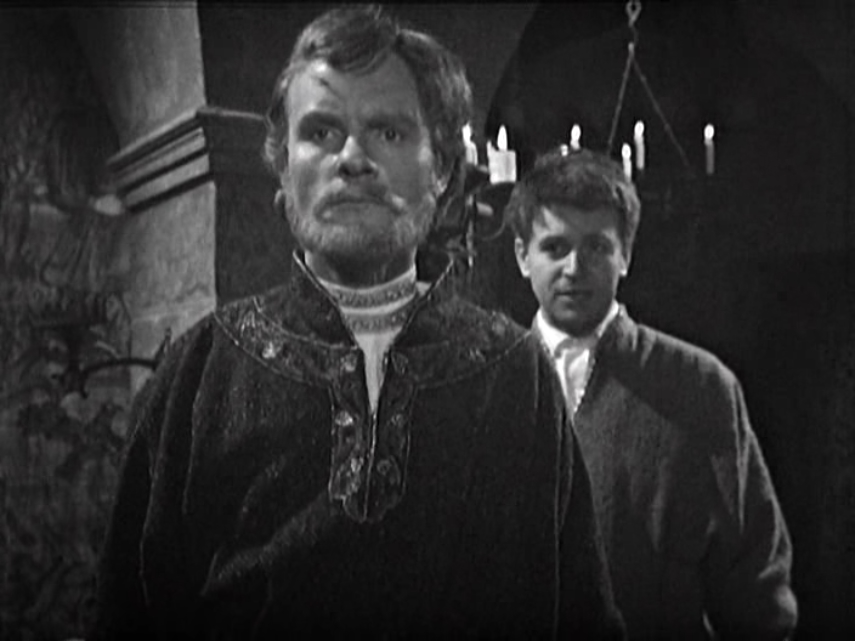
Well, aside from the issues I brought up, this is a good start to the serial. We’ve got some excitement, some intrigue, and questionable casting choices aside, Saladin does seem so far to be given his due as a merciful opponent with a strategic mind. I also love Ian standing up to the King and breaking through his little tantrum. On we go!
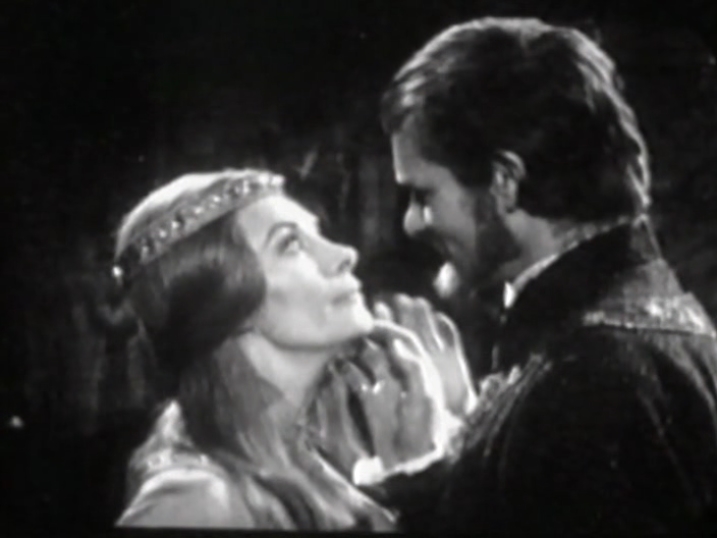
THE KNIGHT OF JAFFA
My television reception was a bit spotty whilst watching this, so I apologise if I've missed anything significant.
The knight the gang rescued intercedes on their behalf, pointing that they have a great opportunity to make Saladin look foolish, thus boosting morale.
King Richard agrees, as the real Joanna arrives. Here commences a subplot which doesn’t really go anywhere, in which the Doctor passes Vicki off as his young male ward, Victor.
Richard laments that he misses England, which is funny considering that he spent the majority of his adult life everywhere but England, and quite likely didn’t speak English. To be fair to him, the weather is terrible.
Elsewhere, El-Akir attempts to coerce a woman to give him information on Barbara. When he fails, he enlists a Genoese merchant, Luigi, to aid him in abducting her.
Barbara talks to her maid, Sheyrah, as she prepares to perform for Saladin. Sheyrah is the woman El-Akir was threatening before, and she warns Barbara of the danger he poses.
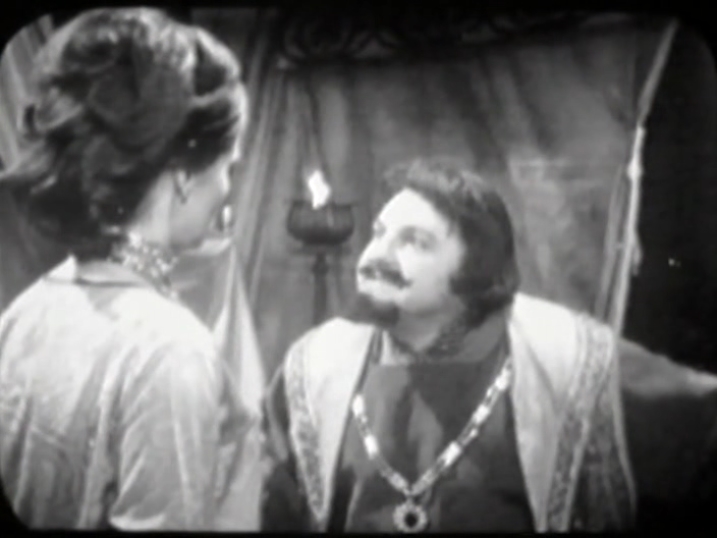
As Barbara thinks about what stories she can tell to entertain Saladin, the merchant arrives, offering her an escape. She takes the bait and leaves with him, but in their haste Luigi accidentally leaves his glove behind for Sheyrah to find.
Elsewhere, Richard’s changed his mind about dealing with Saladin. In fact, he goes as far in the opposite direction as he can, offering up Joanna as a bride to Saphadin in exchange for peace.
It's a dramatic change of heart, to say the least.
Richard charges Ian to be his delivery boy, but because he can't just send some no-name peasant to deliver a royal message, he bids Ian kneel and dubs him the Knight of Jaffa on the spot.
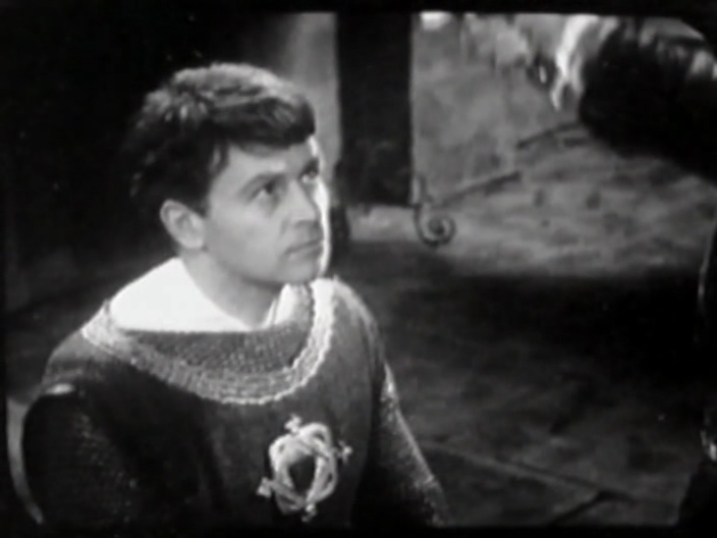
I hope he doesn't start putting on airs and graces.
Luigi gets a meeting with Saladin, having done El-Akir’s bidding. However, the meeting doesn't last long, as Saladin has learned that his Scheherezade has vanished into the ether, and calls Sir William and Sheyrah in to find out what happened to her.
The gig's up for Luigi when Sheyrah shows Saladin the glove she found, and he recognises the matching glove hanging from Luigi's belt. Under duress, Luigi admits that he delivered Barbara to El-Akir.
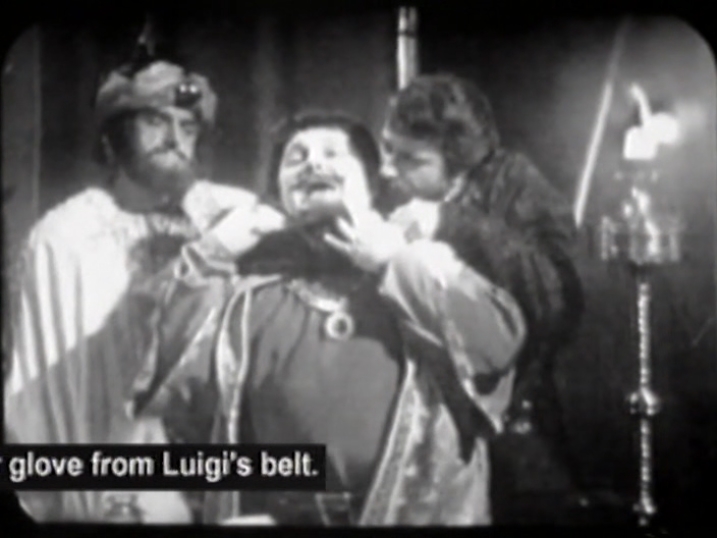
In Jaffa, Ian makes his departure, and far away in the town of Lydda, Barbara arrives at El-Akir's palace. Before she can be ushered into the lion's den, she makes a break for it, leaving the guards in the dust.
Ian arrives at Ramla to learn the bad news from Sir William. Luigi has spun a tale of Barbara having eloped with El-Akir, which the Sultan and his brother accepted, although Sir William can see straight through it.
Ian decides he must go into his territory and rescue Barbara, despite El-Akir's wicked reputation.
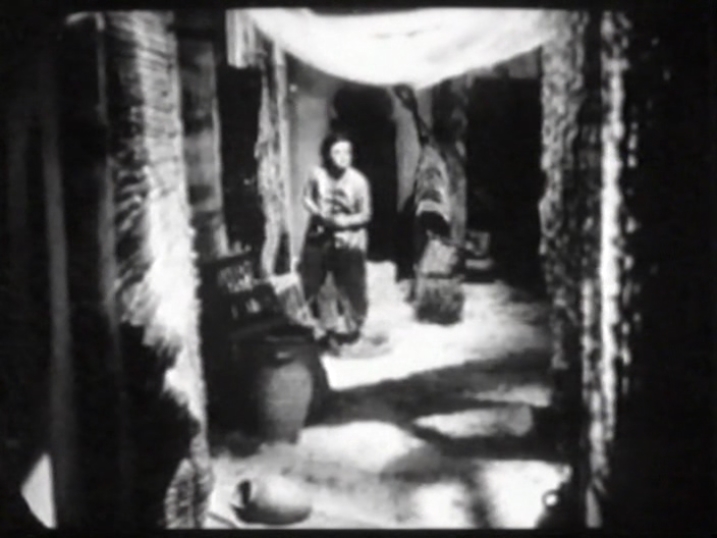
Barbara flees through the streets of Lydda. It's a nice little set, with plenty of detail, evoking the atmosphere of a narrow street in the Middle East, quiet for now, but surely bustling and full of life in the daylight hours.
However, she can't avoid the guards forever.
Before they can grab her, however, a hand emerges from the dark and grabs Barbara's mouth, dragging her into the darkness. Is she saved, or is she doomed?
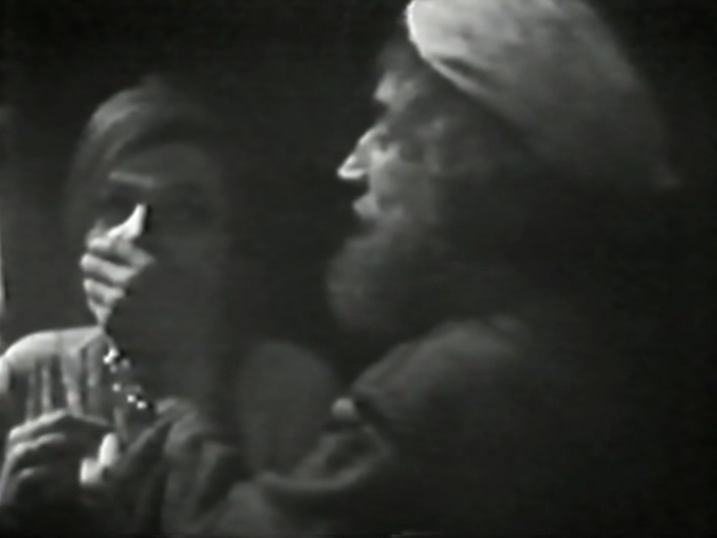
THE WHEEL OF FORTUNE
The stranger beckons Barbara to come with him, and hides her, before subduing the guards. He introduces himself as Haroun, and they have a common enemy in El-Akir, for the Emir stole one of Haroun’s daughters for his harem, and put Haroun’s wife and son to the sword.
Back at Jaffa, Joanna learns of the Vicki/Victor ruse, and puts an end to it, taking the young woman under her wing. In return, she ropes the Doctor into finding out what plans the king has for her.
However, Vicki isn’t too happy about having to go off with this stranger. The Doctor reassures her that it’s only for her safety, to keep her out of the way of any court intrigue. It’s a sweet moment, but I do wonder how old Vicki is supposed to be. Even if she’s meant to be around Susan’s age, the dynamic is still a bit weird, as the Doctor seems to treat her as if she’s a little girl. Is he overcompensating?
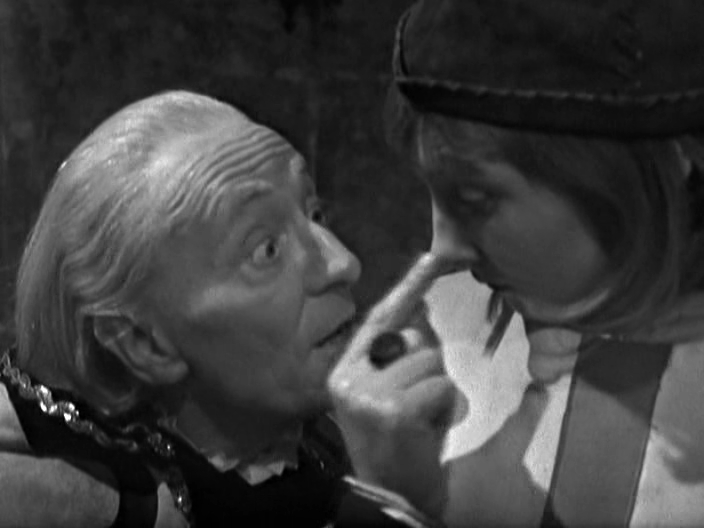
Haroun takes Barbara to his home, where she meets his remaining daughter, Safiya. He goes back out to scout around, giving Barbara a knife as he departs. It’s not for self-defence; if the soldiers come to capture them, she’s to kill Safiya and then herself. Better that than end up at the mercy of El-Akir.
Goodness.
Well, that turned rather dark, didn’t it?
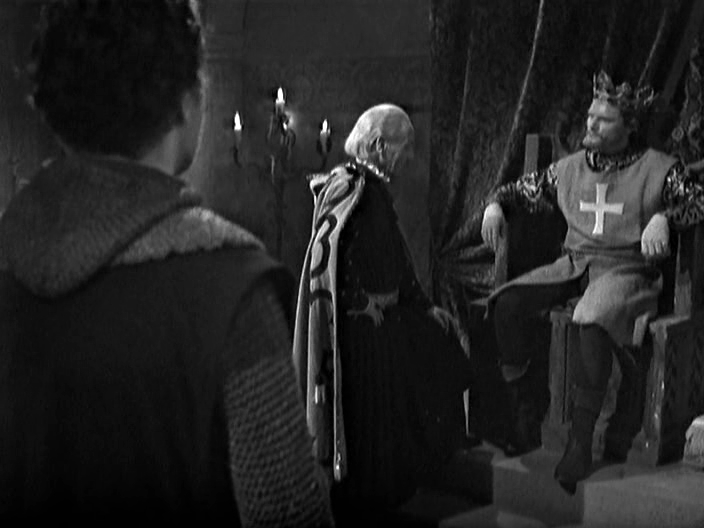
Back with Richard, he’s holding a meeting, and tells everyone (well, the important men anyway) of his intentions to marry Joanna off to Saphadin and end the war. The Doctor asks if he’s run this by Joanna, but silly Doctor, women don’t get to decide who they marry! Besides, she’ll be saving thousands of men’s lives with her sacrifice, so who cares if she likes the bloke or not?
The lord of Leicester isn’t too happy with the plan either, though the non-consensual marriage part doesn’t bother him. No, the problem with the plan is that it’s just not violent enough. He insists that they must take Jerusalem by the sword.
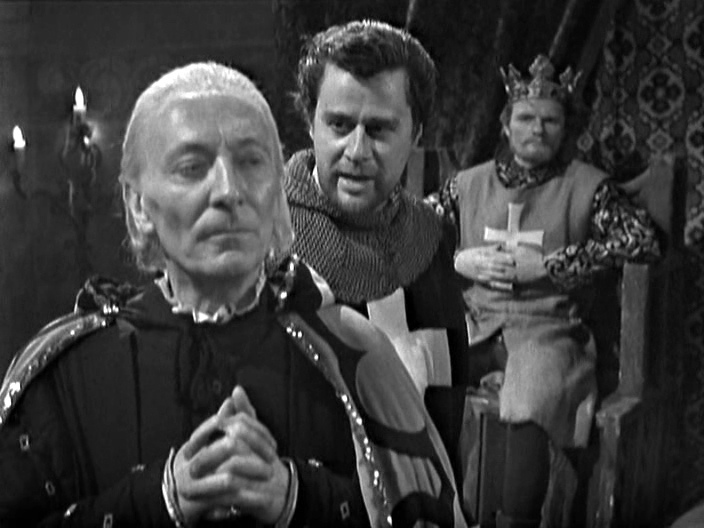
Leicester says it’s all well and good for the Doctor with all his clever words, but when all the eloquent men have gone to bed it’s up to the soldiers to actually put their money where their mouths are. And he has a point there, I’d say, but the Doctor calls him a fool, prompting Leicester to draw steel, though Richard intervenes before things can get out of hand.
Saladin receives the offer, seeming faintly amused by it. Saphadin is quite enthusiastic about the whole idea. A beautiful princess and an alliance giving him power over the kingdom of the Franks? Ring the wedding bells! And with him being staunchly loyal to his brother’s interests, any influence he gained would be Saladin’s, also.
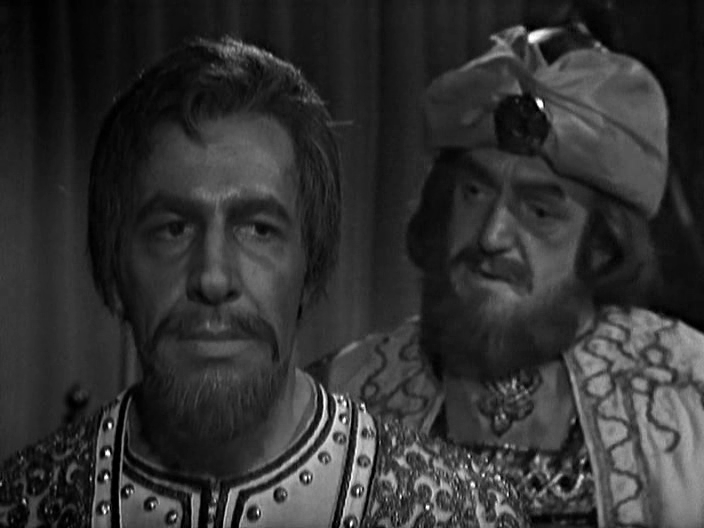
Saladin agrees to let it go ahead, but he’s suspicious of the offer, knowing it’s a last appeal from a weary man. Seeing how delicate the situation has become, he decides to both agree to the match and prepare his armies, should the worst come to pass.
In Haroun’s house, Barbara and Safiya hear the soldiers coming, and hide themselves away. When the soldiers decide to raze the house and smoke them out, Barbara’s faced with the choice: does she use the knife? Well, this is a family show, so Barbara gives the knife to Safiya and attempts to sneak out of the house alone. The soldiers catch her, but at least Safiya is safe.
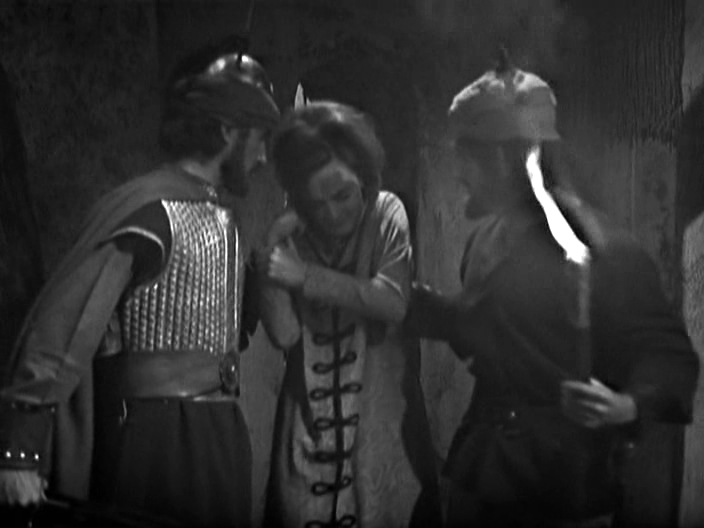
Outside the city, Ian runs into some bandits, who knock him out cold.
In Jaffa, the Doctor finds himself in the middle of some court intrigue. He can’t risk angering Richard by breaching his confidence, but he also can’t make an enemy of the princess by keeping secrets from her. However, Joanna knows he’s keeping something from her, and after prying the truth from Leicester, she furiously confronts her brother.

Turns out women don’t much appreciate it when men try to marry them off against their will. It’s even worse seeing as Saphadin is, from her perspective, an infidel, and the religious animosity at the heart of this war burns strongly in Joanna. If her brother won’t accept her refusal, she’ll be more than happy to drag the Pope into the matter, and he surely won’t allow it.
In Lydda, El-Akir has Barbara dragged before him, and he has a dire threat for her. The only pleasure left for her is death, and that, he assures her, is very far away.
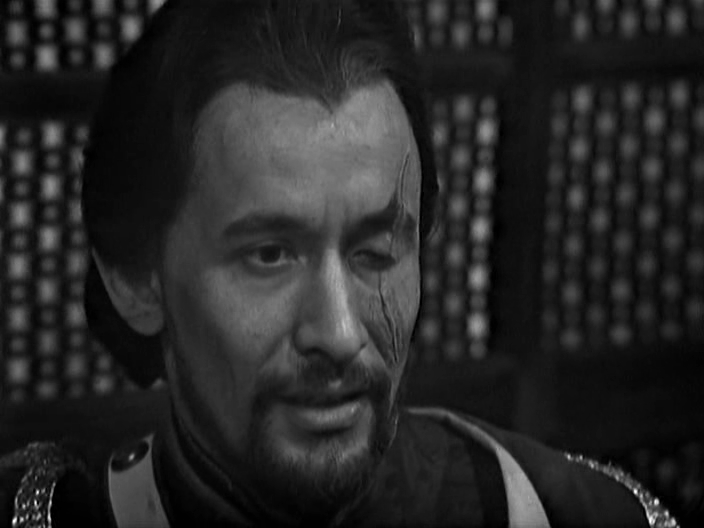
THE WARLORDS
My television set started misbehaving again, so I’m going to blame any oversights in the review on that.
Barbara remains in the Emir’s clutches for all of about ten seconds before escaping him through the ingenious means of knocking some coins out of his hands and then running out the door.
He really should fire his soldiers.
The men race after her and into the harem, where they’re told in no uncertain terms to get lost, as men (apart from the Emir) are forbidden to enter. El-Akir promises a ruby ring for anyone who sees Barbara and reports it to him.
Once he leaves, the women beckon Barbara to come out of her hiding place. Got to love a bit of female solidarity.
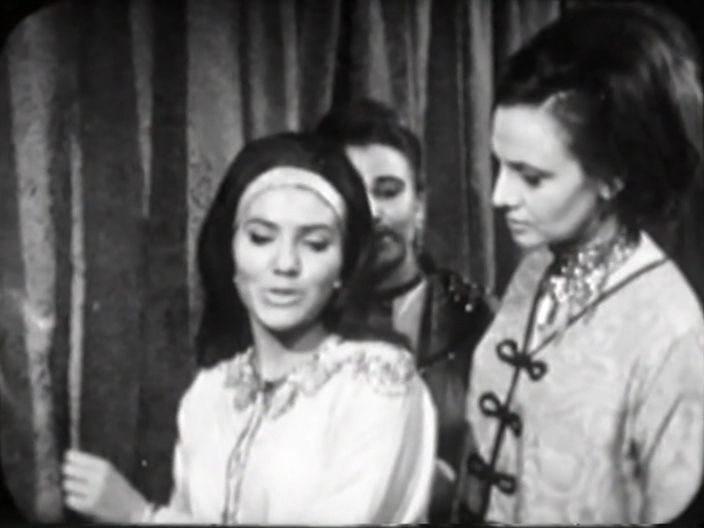
Out in the desert, Ian’s made the acquaintance of a nice chap called Ibrahim, by which I mean Ibrahim has him tied to the ground and dripping with honey. No, you didn’t read that last bit wrong. Ibrahim wants to know where Ian is hiding his money, so has smeared his wrists and chest with honey, and made a trail to the nearby ant nest. Once they get a taste of that honey, they just won’t stop. Well, it’s creative, I’ll give him that. It’s essentially scaphism, an ancient punishment which is very interesting but best not read about before lunch.
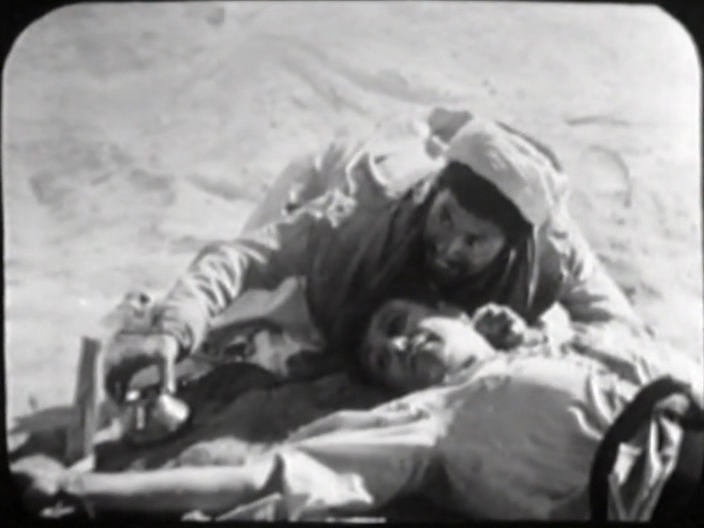
Back in Jaffa, Richard comes to terms with the fact that he will have to fight. For the Doctor’s part, he’s made an enemy of Leicester, and had better take his leave.
Before going, the Doctor asks if Richard thinks he really could hold Jerusalem if he managed to capture it. Richard’s not sure of it himself, but would be content to just see it. Of course, we know that Richard doesn’t win.
In the harem, Barbara meets Safiya’s sister, Maimuna, who is overjoyed to learn that her father and Safiya are alive.
In the desert, with the ants encroaching on him, Ian tells Ibrahim to look for the gold in his boot. Ibrahim, apparently not a smart man, unties Ian’s foot to get to the boot. Finding it empty, he unties the other. Guess what happens next.
This time, Ian succeeds in overpowering Ibrahim and has the bandit take him to Lydda.
In the harem, Barbara discusses a possible route of escape with Maimuna. However, once they leave, one of the other women, Fatima, slips out and goes straight to El-Akir.
Outside the palace, Haroun has recovered his faculties and lurks knife at the ready.
Ian and Ibrahim arrive in Lydda, and Ian steals some clothes from a dead guard. He was already dead when Ian found him, so that’s okay.
He’s found an unlikely ally in Ibrahim, who has as much reason as anyone else to hate El-Akir. The Emir’s a bad man, even by the bandit's standards, and worse still, he’s made everyone poor, so there’s nobody left for him to rob. Ian puts him to good use ‘acquiring’ some horses.
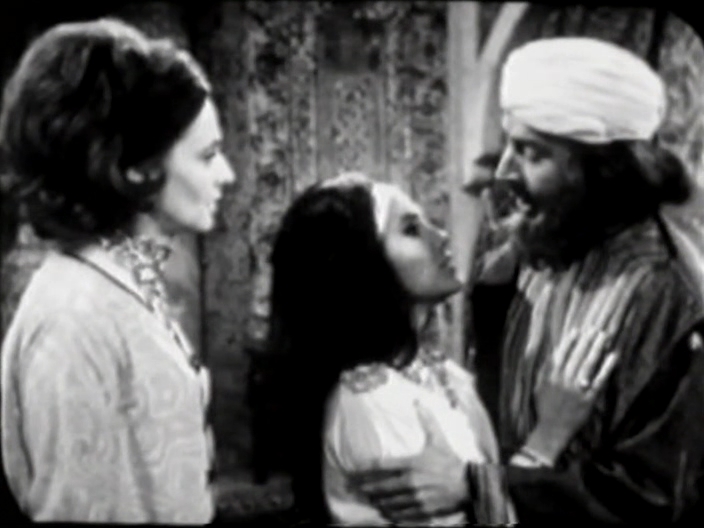
In the harem, the women realise Fatima has betrayed them as El-Akir bursts in, ready to slay Maimuna and Barbara where they stand. Then thwack! A knife hits him in the back, and he drops. Over his body steps Haroun, here to save his daughter.
Fatima arrives late to the party, horrified to find El-Akir dead. Behind her arrives Ian, because apparently the guards at this palace are there for decoration.
All’s well that ends well, and Ian, Haroun, Barbara and Maimuna depart, leaving Fatima to face the justice of the women she betrayed.
Outside Jaffa, the Doctor and Vicki realise that Leicester’s knights are lying in wait for them, thinking them traitors. The Doctor helps Vicki sneak back to the TARDIS, where she meets Barbara, but the Doctor falls into the knights' clutches.
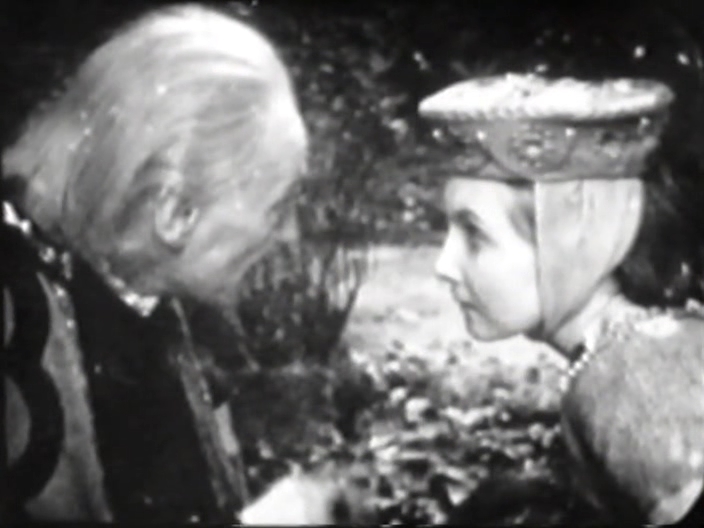
Before the serial can come to a grisly end, Sir Ian, Knight of Jaffa rides up, confirming that the Doctor is indeed a Saracen spy. The Doctor plays along, and Ian escorts him for one last look at Jaffa… and then safely into the TARDIS, where the other knights can’t see them smirk.
When the ship vanishes before their very eyes, they mourn for Ian, spirited away by fiends, and swear never to speak of this matter again.
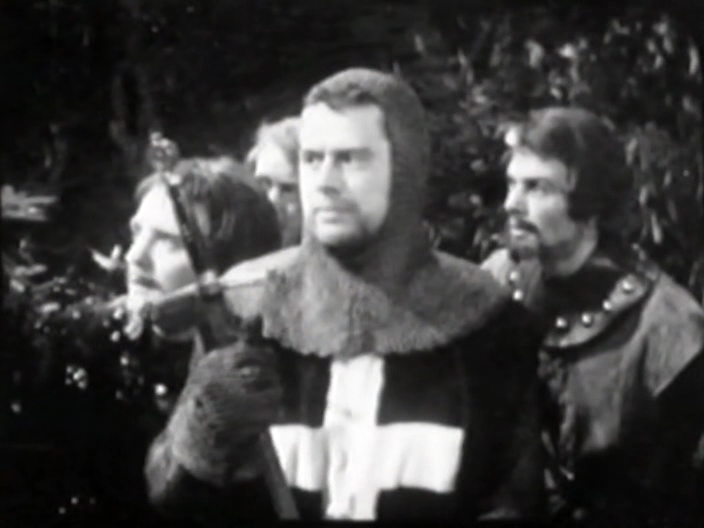
Back in the TARDIS, the Doctor and Barbara have a little banter about his piloting skills, and it seems all is well… for about ten seconds, before the shining control room plunges into darkness.
What happens then? Well, we’ll have to wait and see…
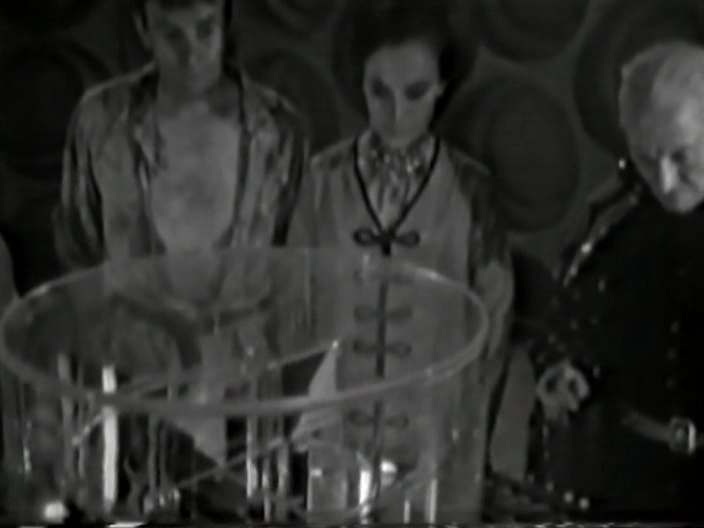
Final Thoughts
This is rather a dark serial for Doctor Who, quite serious in tone and subject matter, with the sword of Damocles perpetually hanging over the head of every character.
I very much enjoyed Glover’s King Richard, even if he did wax a little Shakesperean from time to time. However, I’m not sure how true to the character of the actual King Richard this portrayal is. The Richard of The Crusade is a war-weary man, missing England and wishing for an end to all the fighting and a chance to hang up his sword.
The real Richard, on the other hand, although revered in his time as a great knight and viewed by his subjects as a heroic and pious king, was also known for his cruelty both before his reign and during it. The passing centuries have been kind to Richard, transforming him into the quintessential knight in shining armour, a true king on a holy mission, juxtaposed with his brother, the wicked Prince John, beloved by nobody and vilified by all.
Saladin, for his part, seems to be treated quite fairly. He is noted for his mercy and intelligence, which are on display here, though his merciful acts do seem to be framed as more tactical than altruistic. Of course, there is the issue of his physical portrayal, as I mentioned at some length above. It is a recurring issue with historical episodes, as there have been a number of occasions where there was a lack of an attempt at authentic casting. For example, we have this serial, as well as The Aztecs, and perhaps most egregiously in Marco Polo. I feel it would genuinely strengthen the episodes and their credibility if there was more of a push towards authenticity in casting, and not just in set and costume design.
On a side note, it just clicked with me that the Doctor didn’t meet Saladin face to face. That’s a pity, as I think they’d be very interesting together. I think they’d get along… mostly.
Joanna, recorded as simply Joan in the historical record, was indeed offered as a bargaining chip to Saladin’s brother, though it would seem that high-ranking priests vetoed the match without her involvement. Also, I am not certain that she was ever at Jaffa with Richard.
El-Akir seemed at first to be a little too villainous, being only one kicked kitten away from turning into a cartoon villain. As far as I can tell, he’s not real, and if he’s based in part on any real historical characters, I couldn’t tell you who. However, upon reflection, I think he’s one of the more menacing villains to appear on Doctor Who. As with the Daleks, it’s because he’s 'real'. Yes, it’s a contradiction. The character himself may not have really walked the Earth, but thousands upon thousands have followed in his footsteps all the same.
At risk of this review turning into a historical essay (of questionable accuracy), I think that I had better arrive at some sort of conclusion.
The Crusade is a tightly-written and exciting story, with excellent character work (if we set strict historical accuracy to one side) and a high production value. It raises some interesting points about the cost of war and what actions are acceptable in the name of peace. Were I educated in philosophy, I could have a field day examining it from every which way. It’s also a significant improvement from writer David Whitaker, who previously gave us The Edge Of Destruction (still my least favourite serial) and The Rescue (decent, but fairly forgettable to be honest).
At any rate, it inspired me to read up on the Third Crusade and take steps towards educating myself about this period. If it worked for me, it will have worked for goodness knows how many kids, some of whom are sure to fall down the rabbit-hole into a lifelong love of history. And in the end, isn’t that the important thing?
4 out of 5 stars
Don't miss the next episode of The Journey Show, this time featuring flautist Acacia Weber…and, of course, your Q&A about life in April 1965!




"Saladin assumes that she means she’s with a group of players, entertainers– in other words, not useful."
I don't think women would have been acting in a group of strolling players in 13th century England, and probably still less likely in the Islamic world. Maybe Saladin assumes that "with" means she's a "camp follower" of said group?
I have been thinking about these episodes and I definitely had mixed feelings. Doing Doctor Who characters walking into Walter Scott's Talisman isn't a terrible concept and I think it was better than The Web Planet and at least didn't have the creepy antics of The Romans. But it still had problems and I wouldn't say I super enjoyed it.
Whilst I am still liking it, I don't think Vicki has had as many great episodes as the Susan era did.
Hopefully something more to my tastes is coming soon.